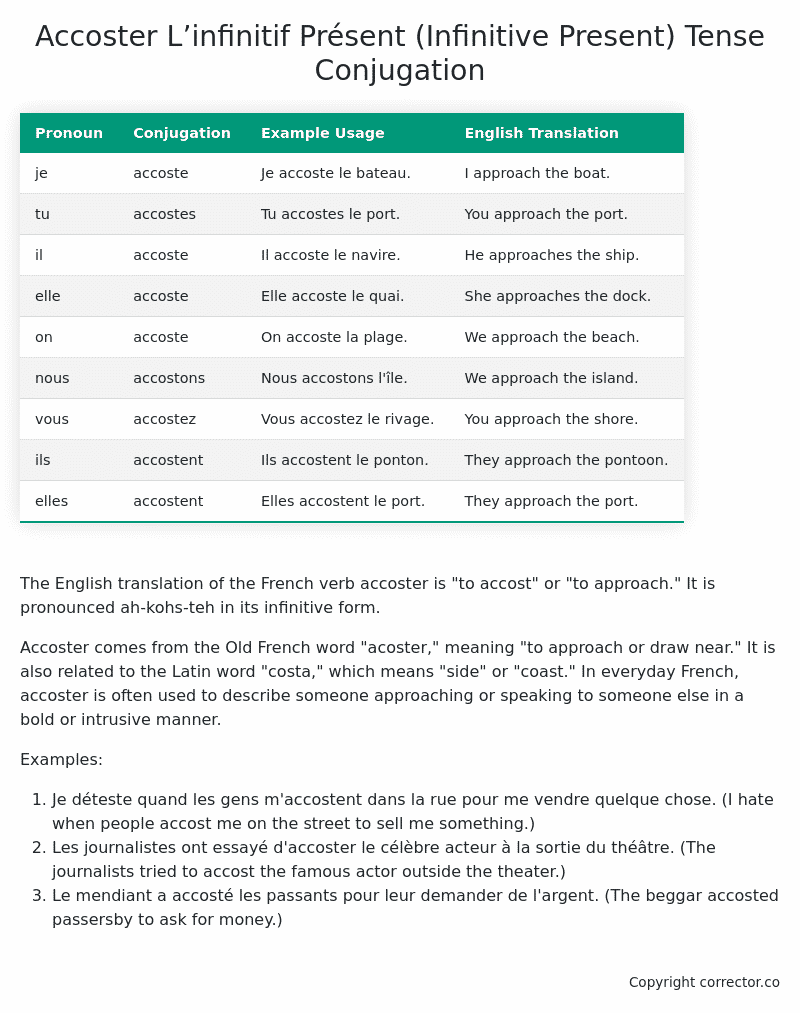L’infinitif Présent (Infinitive Present) Tense Conjugation of the French Verb accoster
Introduction to the verb accoster
The English translation of the French verb accoster is “to accost” or “to approach.” It is pronounced ah-kohs-teh in its infinitive form.
Accoster comes from the Old French word “acoster,” meaning “to approach or draw near.” It is also related to the Latin word “costa,” which means “side” or “coast.” In everyday French, accoster is often used to describe someone approaching or speaking to someone else in a bold or intrusive manner.
Examples:
- Je déteste quand les gens m’accostent dans la rue pour me vendre quelque chose. (I hate when people accost me on the street to sell me something.)
- Les journalistes ont essayé d’accoster le célèbre acteur à la sortie du théâtre. (The journalists tried to accost the famous actor outside the theater.)
- Le mendiant a accosté les passants pour leur demander de l’argent. (The beggar accosted passersby to ask for money.)
Table of the L’infinitif Présent (Infinitive Present) Tense Conjugation of accoster
| Pronoun | Conjugation | Example Usage | English Translation |
|---|---|---|---|
| je | accoste | Je accoste le bateau. | I approach the boat. |
| tu | accostes | Tu accostes le port. | You approach the port. |
| il | accoste | Il accoste le navire. | He approaches the ship. |
| elle | accoste | Elle accoste le quai. | She approaches the dock. |
| on | accoste | On accoste la plage. | We approach the beach. |
| nous | accostons | Nous accostons l’île. | We approach the island. |
| vous | accostez | Vous accostez le rivage. | You approach the shore. |
| ils | accostent | Ils accostent le ponton. | They approach the pontoon. |
| elles | accostent | Elles accostent le port. | They approach the port. |
Other Conjugations for Accoster.
Le Present (Present Tense) Conjugation of the French Verb accoster
Imparfait (Imperfect) Tense Conjugation of the French Verb accoster
Passé Simple (Simple Past) Tense Conjugation of the French Verb accoster
Passé Composé (Present Perfect) Tense Conjugation of the French Verb accoster
Futur Simple (Simple Future) Tense Conjugation of the French Verb accoster
Futur Proche (Near Future) Tense Conjugation of the French Verb accoster
Plus-que-parfait (Pluperfect) Tense Conjugation of the French Verb accoster
Passé Antérieur (Past Anterior) Tense Conjugation of the French Verb accoster
Futur Antérieur (Future Anterior) Tense Conjugation of the French Verb accoster
Subjonctif Présent (Subjunctive Present) Tense Conjugation of the French Verb accoster
Subjonctif Passé (Subjunctive Past) Tense Conjugation of the French Verb accoster
Subjonctif Imparfait (Subjunctive Imperfect) Tense Conjugation of the French Verb accoster
Subjonctif Plus-que-parfait (Subjunctive Pluperfect) Tense Conjugation of the French Verb accoster
Conditionnel Présent (Conditional Present) Tense Conjugation of the French Verb accoster
Conditionnel Passé (Conditional Past) Tense Conjugation of the French Verb accoster
L’impératif Présent (Imperative Present) Tense Conjugation of the French Verb accoster
L’infinitif Présent (Infinitive Present) Tense Conjugation of the French Verb accoster (this article)
Struggling with French verbs or the language in general? Why not use our free French Grammar Checker – no registration required!
Get a FREE Download Study Sheet of this Conjugation 🔥
Simply right click the image below, click “save image” and get your free reference for the accoster L’infinitif Présent tense conjugation!

Accoster – About the French L’infinitif Présent (Infinitive Present) Tense
Forming the Infinitive Present
Common Everyday Usage Patterns
As a Verb’s Dictionary Form
After Modal Verbs
As an Imperative
In Infinitive Clauses
Interactions with Other Tenses
Present Tense
Future Tense
Conditional Tense
Passé Composé
Imperfect Tense
Subjunctive and Conditional Moods
Summary
Want More?
I hope you enjoyed this article on the verb accoster. Still in a learning mood? Check out another TOTALLY random French verb conjugation!


